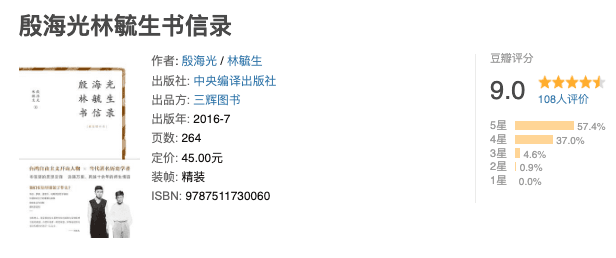
I have previously read Mr. Yin Hai Guang's translation of "The Road to Serfdom" (written by Hayek, translated as "The Road to Serfdom" in mainland China), and I deeply admire it. Recently, I came across a collection of his letters titled "Letters of Yin Hai Guang and Lin Yu Sheng" and immediately started reading it. I have always believed that letters are the best medium to convey a person's inner thoughts.
This book records the correspondence between Yin Hai Guang and his student Lin Yu Sheng for nearly ten years, until Mr. Yin's death on September 16, 1969, at the age of only forty-nine due to stomach cancer. Although they had a teacher-student relationship, they were also friends, and their letters resembled academic exchanges between peers.
Speaking of the two, we cannot avoid mentioning Hayek. Initially, Lin Yu Sheng met Yin Hai Guang because he read "The Road to Serfdom" and later became his student. During this time, Yin Hai Guang persuaded Lin Yu Sheng to study English, and Lin followed his advice. Later, Donald R. Lach from the Department of History at the University of Chicago came to National Taiwan University to give lectures, and the department head selected Lin, who was good at English, to attend the lectures. After the exams, Lin Yu Sheng took the initiative to ask Donald if they could talk and expressed his desire to become a Hayek graduate student at the University of Chicago. Donald gladly agreed. So, Lin Yu Sheng went to the United States to study.
Going abroad for studies not only broadened Lin Yu Sheng's horizons but also opened a "skylight" for Yin Hai Guang, a window to the outside free world. At that time, Yin Hai Guang not only suffered persecution from the authorities but also had limited access to external information. For him, Lin Yu Sheng's "skylight" was extremely precious.
"Brother Yu Sheng, quickly send me the works of so-and-so!" This is a common request in the letters, showing the scholar's desire and urgency for academic pursuits, albeit with helplessness and humor. Although deeply trapped, he never gave up on academic research. Regarding reading, he said, "For us, reading is not an end in itself, but only a means: a means to acquire knowledge, a means to help understand the various aspects of the world."
Every time he received a letter from Lin Yu Sheng and the books he sent, he would dance with joy like an old child:
Writing letters to you is my greatest enjoyment, and reading your letters is especially delightful, like a lonely traveler in the desert seeing an oasis. When I receive the package of books you sent, and open it, the fragrance of foreign books wafts in waves. Hey! Brother, the joy that this scene brings to a poor scholar like me, you can easily imagine, right?
And faced with the situation where there was no one to talk to around him, he would curse out loud:
Lately, my health has been relatively good, but unfortunately, I am "a solitary learner without friends." There are two or three students here that I can talk to, but their academic abilities are lacking, so the conversations lack vigor and make me struggle. Those over forty who study grammar and science have almost degenerated to the level of the Zhoukoudian people, and there is simply no one worth talking to.
He and Lin Yu Sheng, despite being thousands of miles apart, are like the poet Baiwu's line of poetry: "A thousand miles on horseback is not as good as having one true friend."
Yin Hai Guang once guided Lin Yu Sheng onto the path of research with a faint light, and Lin Yu Sheng, in turn, opened a skylight to the world of freedom, achieving mutual success.